formerly eScholarship Editions


|
|
|
|
Your request for similar items found 20 book(s). | Modify Search | Displaying 1 - 20 of 20 book(s) | |
| 1. |  | Title: The elusive embryo: how women and men approach new reproductive technologies Author: Becker, Gaylene Published: University of California Press, 2000 Subjects: Anthropology | Cultural Anthropology | Sociology | Gender Studies | Medical Anthropology | Medicine | Women's Studies | Science Publisher's Description: In the first book to examine the industry of reproductive technology from the perspective of the consumer, Gay Becker scrutinizes the staggering array of medical options available to women and men with fertility problems and assesses the toll - both financial and emotional - that the quest for a biological child often exacts from would-be parents. Becker interviewed hundreds of people over a period of years; their stories are presented here in their own words. Absorbing, informative, and in many cases moving, these stories address deep-seated notions about gender, self-worth, and the cultural ideal of biological parenthood. Becker moves beyond people's personal experiences to examine contemporary meanings of technology and the role of consumption in modern life. What emerges is a clear view of technology as culture, with technology the template on which issues such as gender, nature, and the body are being rewritten and continuously altered. The Elusive Embryo chronicles the history and development of reproductive technology, and shows how global forces in consumer culture have contributed to the industry's growth. Becker examines how increasing use of reproductive technology has changed ideas about "natural" pregnancy and birth. Discussing topics such as in vitro fertilization, how men and women "naturalize" the use of a donor, and what happens when new reproductive technologies don't work, Becker shows how the experience of infertility has become increasingly politicized as potential parents confront the powerful forces that shape this industry. The Elusive Embryo is accessible, well written, and well documented. It will be an invaluable resource for people using or considering new reproductive technologies as well as for social scientists and health professionals. [brief] Similar Items |
| 2. | 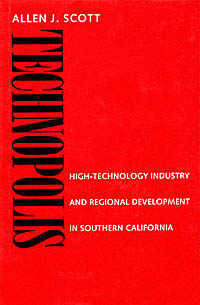 | Title: Technopolis: high-technology industry and regional development in southern California Author: Scott, Allen John Published: University of California Press, 1994 Subjects: Urban Studies | Geography | Politics Publisher's Description: Technopolis is a timely theoretical and empirical investigation of the world's largest high-technology industrial complex - Southern California. Allen Scott provides a new conceptual framework for understanding urban and regional growth processes based on a combination of inter-industrial, labor market, and geographical factors. He presents case studies and original data on three major industries that have become synonymous with Southern California: aircraft and parts, missiles and space equipment, and electronics. The business community will be particularly interested in Scott's diagnosis of post-Cold War economic ills and his suggestions for possible remedies.In good times or bad, knowledge of how Southern California's high-tech industry and regional development have interacted in the past and might interact in the future will be invaluable for regional and economic planners everywhere. [brief] Similar Items |
| 3. | 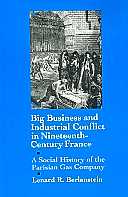 | Title: Big business and industrial conflict in nineteenth-century France: a social history of the Parisian Gas Company Author: Berlanstein, Lenard R Published: University of California Press, 1991 Subjects: History | European History | French Studies | Economics and Business | Technology and Society Publisher's Description: Founded in 1855, the Parisian Gas Company (PGC) quickly developed into one of France's greatest industrial enterprises, an exemplar of the new industrial capitalism that was beginning to transform the French economy. The PGC supplied at least half the coal gas consumed in France through the 1870s and became the city's single largest employer of clerical and factory labor. Representing a new form and scale of capitalistic endeavor, the firm's history illuminates the social tensions that accompanied the nation's industrialization and democratization.To study the company over its fifty-year life is to see industrializing France writ small. Using previously untapped company archives, Lenard R. Berlanstein has written a rich and detailed study that skillfully bridges the divide between business, social, and labor history. [brief] Similar Items |
| 4. | 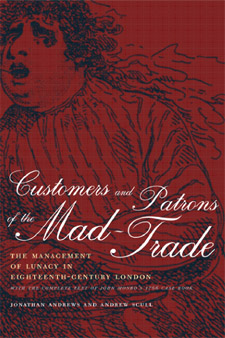 | Title: Customers and patrons of the mad-trade: the management of lunacy in eighteenth-century London: with the complete text of John Monro's 1766 case book Author: Andrews, Jonathan 1961- Published: University of California Press, 2003 Subjects: History | History of Science | Psychology | Social Problems | Psychiatry Publisher's Description: This book is a lively commentary on the eighteenth-century mad-business, its practitioners, its patients (or "customers"), and its patrons, viewed through the unique lens of the private case book kept by the most famous mad-doctor in Augustan England, Dr. John Monro (1715-1791). Monro's case book, comprising the doctor's jottings on patients he saw in the course of his private practice--patients drawn from a great variety of social strata--offers an extraordinary window into the subterranean world of the mad-trade in eighteenth-century London. The volume concludes with a complete edition of the case book itself, transcribed in full with editorial annotations by the authors. In the fragmented stories Monro's case book provides, Andrews and Scull find a poignant underworld of human psychological distress, some of it strange and some quite familiar. They place these "cases" in a real world where John Monro and othersuccessful doctors were practicing, not to say inventing, the diagnosis and treatment of madness. [brief] Similar Items |
| 5. | 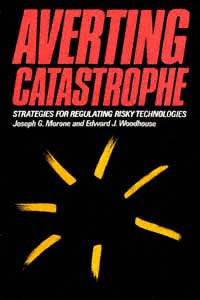 | Title: Averting catastrophe: strategies for regulating risky technologies Author: Morone, Joseph G Published: University of California Press, 1988 Subjects: Environmental Studies | History and Philosophy of Science | Politics Publisher's Description: Chernobyl, Bhopal, and Love Canal are symbols of the potentially catastrophic risks that go hand in hand with much modern technology. This volume is a non-partisan study of the imperfect but steadily developing system for containing the risks of such technologies as chemicals, nuclear power, and gen . . . [more] Similar Items |
| 6. | 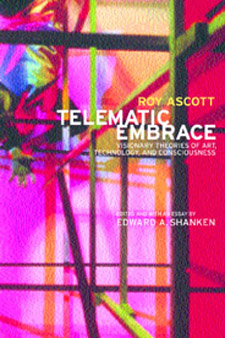 | Title: Telematic embrace: visionary theories of art, technology, and consciousness Author: Ascott, Roy Published: University of California Press, 2003 Subjects: Art | Art Theory | Electronic Media Publisher's Description: Long before e-mail and the Internet permeated society, Roy Ascott, a pioneering British artist and theorist, coined the term "telematic art" to describe the use of online computer networks as an artistic medium. In Telematic Embrace Edward A. Shanken gathers, for the first time, an impressive compilation of more than three decades of Ascott's philosophies on aesthetics, interactivity, and the sense of self and community in the telematic world of cyberspace. This book explores Ascott's ideas on how networked communication has shaped behavior and consciousness within and beyond the realm of what is conventionally defined as art. Telematics, a powerful marriage of computers and telecommunication, made technologies we now take for granted - such as e-mail and automated teller machines (ATMs) - part of our daily life, and made art a more interactive form of expression. Telematic art challenges traditional relationships between artist, artwork, and audience by allowing nonlocal audiences to influence the emergent qualities of the artwork, which consists of the ebb and flow of electronic information. These essays constitute a unique archaeology of ideas, tracing Ascott's meditations on the formation of consciousness through the intertwined cultural histories of art and technology from the 1960s to the present. Shanken's introduction situates Ascott's work within a history of ideas in art, technology, and philosophy. Given the increasing role of the Internet and the World Wide Web in the creation of commerce and community at the dawn of this new millennium, scholars, students, laypeople, policymakers, and artists will find this collection informative and thought-provoking. [brief] Similar Items |
| 7. |  | Title: Technology and gender: fabrics of power in late imperial China Author: Bray, Francesca Published: University of California Press, 1997 Subjects: Anthropology | History | China | Women's Studies Publisher's Description: In this feminist history of eight centuries of private life in China, Francesca Bray inserts women into the history of technology and adds technology to the history of women. Bray takes issue with the Orientalist image that traditional Chinese women were imprisoned in the inner quarters, deprived of freedom and dignity, and so physically and morally deformed by footbinding and the tyrannies of patriarchy that they were incapable of productive work. She proposes a concept of gynotechnics , a set of everyday technologies that define women's roles, as a creative new way to explore how societies translate moral and social principles into a web of material forms and bodily practices.Bray examines three different aspects of domestic life in China, tracing their developments from 1000 to 1800 A.D. She begins with the shell of domesticity, the house, focusing on how domestic space embodied hierarchies of gender. She follows the shift in the textile industry from domestic production to commercial production. Despite increasing emphasis on women's reproductive roles, she argues, this cannot be reduced to childbearing. Female hierarchies within the family reinforced the power of wives, whose responsibilities included ritual activities and financial management as well as the education of children. [brief] Similar Items |
| 8. |  | Title: Technology and scholarly communication Author: Ekman, Richard Published: University of California Press, 1999 Subjects: Media Studies | Technology and Society | Library Science | Reference | Economics and Business | Electronic Media Publisher's Description: Electronic publishing has been gaining ground in recent years and is now a recognized part of the digital world. In the most comprehensive assessment of electronic publishing to date, thirty-one scholars, librarians, and publishers focus specifically on scholarly publishing. They analyze a number of case studies and offer original insights on a range of topics, including the financial costs involved, market forces, appropriate technological standards, licensing issues, intellectual property, copyright and associated user rights, and the changing roles of researchers, publishers, and librarians.The editors begin with an overview of scholarly communication and develop a novel interpretation of the important role that technology now plays. Many of the following chapters are based on actual electronic publishing projects in the sciences, social sciences, and humanities, so the evidence and data are drawn from real-life experiences. Of special value are the attempts to measure costs and patterns of usage of electronic publishing and digital libraries.Electronic publishing has moved well past the experimental stage, and with numerous projects under way this seems an appropriate time to assess its impact on the academic world, from teaching to research to administration. [brief] Similar Items |
| 9. |  | Title: Good with their hands: boxers, bluesmen, and other characters from the Rust Belt Author: Rotella, Carlo 1964- Published: University of California Press, 2002 Subjects: History | American Studies | Sociology | Literature | Labor Studies | Urban Studies | Ethnic Studies | Gender Studies Publisher's Description: This eloquent, streetwise book is a paean to America's Rust Belt and a compelling exploration of four milieus caught up in a great transformation of city life. With loving attention to detail and a fine sense of historical context, Carlo Rotella explores women's boxing in Erie, Pennsylvania; Buddy Guy and the blues scene in Chicago; police work and crime stories in New York City, especially as they converged in the making of the movie The French Connection; and attempts at urban renewal in the classic mill city of Brockton, Massachusetts. Navigating through accrued layers of cultural, economic, and personal history, Rotella shows how stories of city life can be found in a boxing match, a guitar solo, a chase scene in a movie, or a landscape. The stories he tells dramatize the coming of the postindustrial era in places once defined by their factories, a sweeping set of changes that has remade the form and meaning of American urbanism. A native of the Rust Belt whose own life resonates with these stories, Rotella has gone to the home turfs of his characters, hanging out in boxing gyms and blues clubs, riding along with cops and moviemakers, discussing the future of Brockton with a visionary artist and a pitbull-fancying janitor who both plan to save the city's soul. These people make culture with their hands, and hands become an expressive metaphor for Rotella as he traces the links between their individual talents and the urban scenes in which they flourish. His writing elegantly connects what happens on the street to the larger story of urban transformation, especially the shift from a way of life that demanded individuals be "good with their hands" to one that depends on the intellectual and social skills fostered by formal education and service work. Strong feelings emerge in this book about what has been lost and gained in the long, slow aging-out of the industrial city. But Rotella's journey through the streets has its ultimate reward in discovering deep-rooted instances of what he calls "truth and beauty in the Rust Belt." [brief] Similar Items |
| 10. | 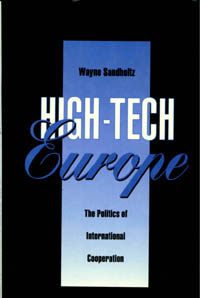 | Title: High-Tech Europe: the politics of international cooperation Author: Sandholtz, Wayne Published: University of California Press, 1992 Subjects: Politics | Public Policy | Economics and Business | Technology and Society Publisher's Description: A study of cooperative efforts in the high-tech industries of Europe. Sandholtz examines why collaboration came late to these countries, how protective walls came down, how countries work together in economically sensitive areas.Governments have recognized for decades the dynamic role played by microelectronics, computers, and telecommunications in the modern economy. Although Europe's deficiencies in these crucial sectors had long been acknowledged, it was not until the 1980s that European nations began collaborating to develop and promote high-tech industries. Their collaboration gives rise to many questions. Why, for example, did the joint efforts come at such a late date rather than in the 1960s or 70s? And how is it possible that they work together in economically sensitive areas? These questions point to fundamental issues in the areas of international cooperation, international institutions, and technology policy.Before the institution of the collaborative programs ESPRIT (European Strategic Programme for Research and Development in Information Technology), RACE (R & D in Advanced Communications-technologies in Europe), and EUREKA (European Research Coordination Agency) in the 1980s, each European country sought its own technological renaissance through protection of national firms behind walls of technical standards, procurement preferences, and research subsidies. Here is a thorough, carefully researched work that examines the breakdown of these walls. It will appeal to political scientists, economists, and scholars of technology and Western Europe interested in the political contours of the high-tech landscape. [brief] Similar Items |
| 11. | 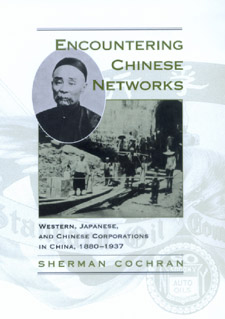 | Title: Encountering Chinese networks: Western, Japanese, and Chinese corporations in China, 1880-1937 Author: Cochran, Sherman 1940- Published: University of California Press, 2000 Subjects: History | Economics and Business | Asian History | China Publisher's Description: Big businesses have faced a persistent dilemma in China since the nineteenth century: how to retain control over corporate hierarchies while adapting to local social networks. Sherman Cochran, in the first study to compare Western, Japanese, and Chinese businesses in Chinese history, shows how various businesses have struggled with this issue as they have adjusted to dramatic changes in Chinese society, politics, and foreign affairs. Cochran devotes a chapter each to six of the biggest business ventures in China before the Communist revolution: two Western-owned companies, Standard Oil and British-American Tobacco Company; two Japanese-owned companies, Mitsui Trading Company and Naigai Cotton Company; and two Chinese-owned firms, Shenxin Cotton Mills and China Match Company. In each case, he notes the businesses' efforts to introduce corporate hierarchies for managing the distribution of goods and the organization of factory workers, and he describes their encounters with a variety of Chinese social networks: tenacious factions of English-speaking compradors and powerful trade associations of non-English-speaking merchants channeling goods into the marketplace; and small cliques of independent labor bosses and big gangs of underworld figures controlling workers in the factories. Drawing upon archival sources and individual interviews, Cochran describes the wide range of approaches that these businesses adopted to deal with Chinese social networks. Each business negotiated its own distinctive relationship with local networks, and as each business learned about marketing goods and managing factory workers in China, it adjusted this relationship. Sometimes it strengthened its hierarchical control over networks and sometimes it delegated authority to networks, but it could not afford to take networks for granted or regard them as static because they, in turn, took their own initiative and made their own adjustments. In this book Cochran calls into question the idea that the spread of capitalism has caused business organizations to converge over time. His cases bring to light numerous organizational forms used by Western, Japanese, and Chinese corporations in China's past, and his conclusions suggest that businesses have experimented with new forms on the basis of their historical experiences - especially their encounters with social networks. [brief] Similar Items |
| 12. | 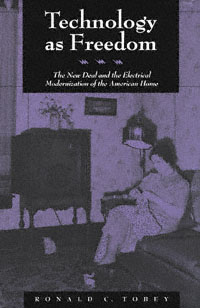 | Title: Technology as freedom: the New Deal and the electrical modernization of the American home Author: Tobey, Ronald C Published: University of California Press, 1997 Subjects: History | American Studies | Technology and Society | United States History Publisher's Description: Before 1930, the domestic market for electrical appliances was segmented, but New Deal policies and programs created a true mass market, reshaping the electrical and housing markets and guiding them toward mandated social goals. The New Deal identified electrical refrigeration as a key technology to reform domestic labor, raise family health, and build family assets. New Deal incentives led to nearly fifty percent of Title I National Housing Act loans being used to buy electric refrigerators in the 1930s. New Deal policies ultimately created the mass commodity culture of home-owning families that typified the conservative 1950s. [brief] Similar Items |
| 13. | 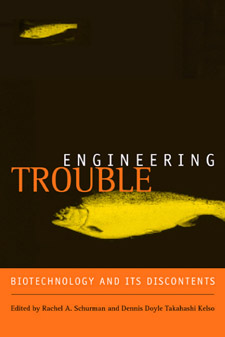 | Title: Engineering trouble: biotechnology and its discontents Author: Schurman, Rachel Published: University of California Press, 2003 Subjects: Sociology | Conservation | EcologyEvolutionEnvironment | Technology and Society | Agriculture | Technology | Public Policy Publisher's Description: Talk of genetically engineered organisms (GEOs) has moved from the hushed corridors of life science corporations to the front pages of the world's major newspapers. As Europeans began rejecting genetically engineered foods in the marketplace, the StarLink corn incident exploded in the United States and farmers set fire to genetically modified crops in India. Citizens and consumers have become increasingly aware of and troubled by the issues surrounding these new technologies. Considering cases from agriculture, food, forestry, and pharmaceuticals, this book examines some of the most pressing questions raised by genetic engineering. What determines whether GEOs enter the food supply, and how are such decisions being made? How is the biotechnology industry using its power to reshape food, fiber, and pharmaceutical production, and how are citizen-activists challenging these initiatives? And what are the social and political consequences of global differences over GEOs? [brief] Similar Items |
| 14. | 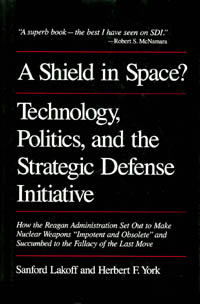 | Title: A shield in space?: technology, politics, and the strategic defense initiative: how the Reagan Administration set out to make nuclear weapons "impotent and obsolete" and succumbed to the fallacy of the last move Author: Lakoff, Sanford A Published: University of California Press, 1989 Subjects: Politics | Political Theory | Technology and Society Publisher's Description: In March 1983, Ronald Reagan made one of the most controversial announcements of his presidency when he called on the nation's scientists and engineers to develop a defensive shield so impenetrable as to make nuclear weapons "impotent and obsolete." This book provides the first comprehensive review and evaluation of the project launched to implement that announcement - the project officially known as the Strategic Defense Initiative and more popularly as "Star Wars." The authors - a political scientist and a physicist who has played a key role in developing military technologies - provide an intriguing account of how political rather than technical judgment led to the initial decision, and they explain the technical issues in terms accessible to nonspecialists. Judging SDI as "a classic example of misplaced faith in the promise of technological salvation," the authors examine the implications of the program for strategy, arms control, the unity of the Western alliance, its prospective economic impact, and the way the American political process has dealt with all these issues. [brief] Similar Items |
| 15. | 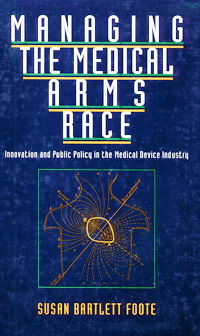 | Title: Managing the medical arms race: public policy and medical device innovation Author: Foote, Susan Bartlett Published: University of California Press, 1992 Subjects: Politics | Medicine | Public Policy | Economics and Business Publisher's Description: The allure of medical innovation is powerful - it holds out the promise of perfect health, the end of pain, the deferral of death. Our insatiable appetite for costly new technologies, fed by a profusion of innovations and the profits they generate, has led to what has been dubbed the medical arms race. During the last several decades government has been called upon to manage the escalation of this race.Foote has written the first comprehensive examination of the profound influence of government policies on medical innovation. She explains how these policies have proliferated to affect every stage of the innovative process in medical device technology - from the first research idea to the patient's bedside. Drawing on case studies of technologies as diverse as lasers, cardiac pacemakers, CT scanners, and IUDs, she traces the interaction between the industry and government institutions, including the National Institutes of Health, the FDA, and the Medicare and Medicaid programs.Public policies during the 1950s and 1960s, Foote discovers, tended to promote innovation, while the regulation and cost controls of the 1970s and 1980s began to inhibit it. For the 1990s and beyond she proposes incremental policy improvements that will rationalize and streamline government intervention. She cautions that we must recognize the limits of medical technology and public policy to cure all ills.Medical innovation is a crucial part of health care reform, a subject of increasing complexity and controversy. Written clearly and accessibly, Managing the Medical Arms Race is an invaluable source for medical, industry, and policy professionals, but it also has much to say to anybody concerned with how we as a society choose to take care of our health. [brief] Similar Items |
| 16. | 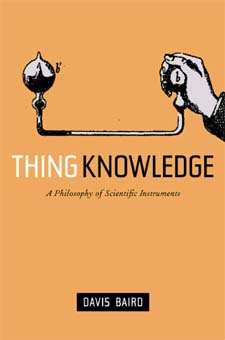 | Title: Thing knowledge: a philosophy of scientific instruments Author: Baird, Davis Published: University of California Press, 2004 Subjects: Philosophy | Technology and Society Publisher's Description: Western philosophers have traditionally concentrated on theory as the means for expressing knowledge about a variety of phenomena. This absorbing book challenges this fundamental notion by showing how objects themselves, specifically scientific instruments, can express knowledge. As he considers numerous intriguing examples, Davis Baird gives us the tools to "read" the material products of science and technology and to understand their place in culture. Making a provocative and original challenge to our conception of knowledge itself, Thing Knowledge demands that we take a new look at theories of science and technology, knowledge, progress, and change. Baird considers a wide range of instruments, including Faraday's first electric motor, eighteenth-century mechanical models of the solar system, the cyclotron, various instruments developed by analytical chemists between 1930 and 1960, spectrometers, and more. [brief] Similar Items |
| 17. | 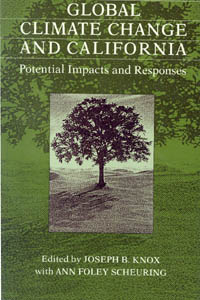 | Title: Global climate change and California: potential impacts and responses Author: Knox, Joseph B Published: University of California Press, 1992 Subjects: Environmental Studies | Ecology | California and the West Publisher's Description: California's extraordinary ecological and economic diversity has brought it prosperity, pollution, and overpopulation. These factors and the state's national and international ties make California an essential test case for the impact of global climate change - temperature increases, water shortages, more ultraviolet radiation. The scientists in this forward-looking volume give their best estimates of what the future holds.Beginning with an overview by Joseph Knox, the book discusses the greenhouse effect, the latest climate modeling capabilities, the implications of climate change for water resources, agriculture, biological ecosystems, human behavior, and energy.The warning inherent in a scenario of unchecked population growth and energy use in California applies to residents of the entire planet. The sobering conclusions related here include recommendations for research that will help us all prepare for potential climate change. [brief] Similar Items |
| 18. | 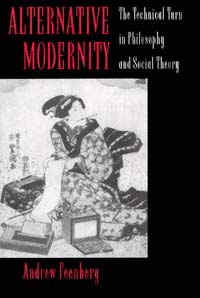 | Title: Alternative modernity: the technical turn in philosophy and social theory Author: Feenberg, Andrew Published: University of California Press, 1995 Subjects: Philosophy | Social and Political Thought | History and Philosophy of Science | Popular Culture Publisher's Description: In this new collection of essays, Andrew Feenberg argues that conflicts over the design and organization of the technical systems that structure our society shape deep choices for the future. A pioneer in the philosophy of technology, Feenberg demonstrates the continuing vitality of the critical theory of the Frankfurt School. He calls into question the anti-technological stance commonly associated with its theoretical legacy and argues that technology contains potentialities that could be developed as the basis for an alternative form of modern society.Feenberg's critical reflections on the ideas of Jürgen Habermas, Herbert Marcuse, Jean-François Lyotard, and Kitaro Nishida shed new light on the philosophical study of technology and modernity. He contests the prevalent conception of technology as an unstoppable force responsive only to its own internal dynamic and politicizes the discussion of its social and cultural construction.This argument is substantiated in a series of compelling and well-grounded case studies. Through his exploration of science fiction and film, AIDS research, the French experience with the "information superhighway," and the Japanese reception of Western values, he demonstrates how technology, when subjected to public pressure and debate, can incorporate ethical and aesthetic values. [brief] Similar Items |
| 19. |  | Title: Draw the lightning down: Benjamin Franklin and electrical technology in the Age of Enlightenment Author: Schiffer, Michael B Published: University of California Press, 2003 Subjects: History | Urban Studies | History of Science | Anthropology | American Studies | European History Publisher's Description: Most of us know - at least we've heard - that Benjamin Franklin conducted some kind of electrical experiment with a kite. What few of us realize - and what this book makes powerfully clear - is that Franklin played a major role in laying the foundations of modern electrical science and technology. This fast-paced book, rich with historical details and anecdotes, brings to life Franklin, the large international network of scientists and inventors in which he played a key role, and their amazing inventions. We learn what these early electrical devices - from lights and motors to musical and medical instruments - looked like, how they worked, and what their utilitarian and symbolic meanings were for those who invented and used them. Against the fascinating panorama of life in the eighteenth century, Michael Brian Schiffer tells the story of the very beginnings of our modern electrical world. The earliest electrical technologies were conceived in the laboratory apparatus of physicists; because of their surprising and diverse effects, however, these technologies rapidly made their way into many other communities and activities. Schiffer conducts us from community to community, showing how these technologies worked as they were put to use in public lectures, revolutionary experiments in chemistry and biology, and medical therapy. This story brings to light the arcane and long-forgotten inventions that made way for many modern technologies - including lightning rods (Franklin's invention), cardiac stimulation, xerography, and the internal combustion engine - and richly conveys the complex relationships among science, technology, and culture. [brief] Similar Items |
| 20. | 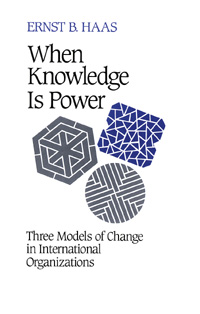 | Title: When knowledge is power: three models of change in international organizations Author: Haas, Ernst B Published: University of California Press, 1991 Subjects: Politics | Political Theory | Economics and Business Publisher's Description: Do governments seeking to collaborate in such international organizations as the United Nations and the World Bank ever learn to improve the performance of those organizations? Can international organizations be improved by a deliberate institutional design that reflects lessons learned in peacekeeping, the protection of human rights, and environmentally sound economic development? In this incisive work, Ernst Haas examines these and other issues to delineate the conditions under which organizations change their methods for defining problems. Haas contends that international organizations change most effectively when they are able to redefine the causes underlying the problems to be addressed. He shows that such self-reflection is possible when the expert-generated knowledge about the problems can be made to mesh with the interests of hegemonic coalitions of member governments. But usually efforts to change organizations begin as adaptive practices that owe little to a systematic questioning of past behavior. Often organizations adapt and survive without fully satisfying most of their members, as has been the case with the United Nations since 1970. When Knowledge Is Power is a wide-ranging work that will elicit interest from political scientists, organization theorists, bureaucrats, and students of management and international administration. [brief] Similar Items |